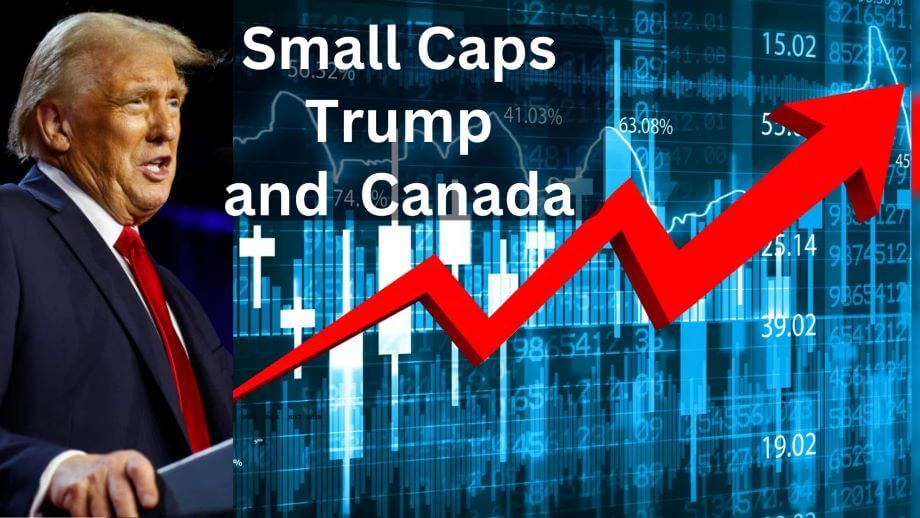Over the past year, the Russell 2000 (small-cap index) has outperformed the S&P 500 (large-cap index), with returns of 38.46% compared to 36.94%. While the difference isn’t huge, both indexes have performed exceptionally well.
Trump made a lot of promises during his election campaign. He promised: Lower taxes, tariff, deregulation, and low interest rates. How would the stock market react if he keeps his promise?
With Trump’s return to the presidency, I believe small-cap stocks could see stronger growth compared to large-cap stocks, while the Canadian economy may face challenges. Here’s why:
1. Tax Cuts and Small-Cap Companies
Tax Advantages for Smaller Companies: Trump has previously pledged to cut corporate taxes. Unlike large multinational companies that can use complex tax strategies to lower their rates, small-cap companies usually pay higher U.S. tax rates because they operate mainly within the country.
Potential Impact: Lower taxes could significantly reduce costs for small-cap companies, boosting their net income and profitability more than for larger firms that already pay lower effective tax rates.
2. Protectionist Policies and Local Production
Focus on Domestic Growth: Trump’s protectionist stance could reduce imports and increase demand for U.S.-made goods. This could benefit domestic companies, particularly small-cap firms that don’t rely on global supply chains.
Profit Margins: Small-cap businesses focused on local markets might see improved profit margins if they step in to fill gaps left by reduced imports. Large-cap companies, with their international focus, may not benefit as much.
3. Deregulation and Business Growth
Lower Compliance Costs: Trump has supported deregulation, which could reduce the compliance burden for businesses. This would be especially beneficial for smaller companies that don’t have the resources of large corporations to manage extensive regulations.
Expansion Opportunities: With fewer regulatory barriers, small businesses might expand faster, improving growth for companies in the Russell 2000.
4. Lower Interest Rates
Cheaper Loans: Small-cap companies often rely on borrowing to finance their growth. Lower interest rates mean cheaper loans, helping them save on interest payments and redirect cash toward business expansion.
Debt Refinancing: Companies can refinance existing debt at lower rates, reducing financial strain and boosting profitability.
Challenges and Risks to Consider
Trade Tensions: While protectionist policies could help domestic producers, they might lead to retaliatory tariffs from other countries, affecting industries that rely on exports.
Inflation: If supply chain issues or increased demand for U.S. manufacturing drive up production costs, inflation could curb consumer spending, impacting small-cap stocks.
Potential Impact on the Canadian Market
Tariffs on Canadian Goods: Trump’s relationship with Canadian Prime Minister Justin Trudeau has been rocky, notably during the 2018 G7 Summit, where Trump called Trudeau “weak” and “dishonest” over trade disagreements. If Trump reintroduces tariffs on Canadian products, several negative effects could follow:
Export-Dependent Sectors: Key Canadian industries such as automotive, agriculture, natural resources (e.g., lumber and oil), and manufacturing could see revenue declines as tariffs make their products more expensive and less competitive in the U.S. market. This would likely lead to falling stock prices in these sectors.
Supply Chain Disruptions: Companies that rely on cross-border trade between the U.S. and Canada might face operational setbacks, affecting their financial performance and stock value.
Conclusion
In summary, a Trump presidency could create favorable conditions for U.S. small-cap stocks through tax cuts, protectionist trade policies, deregulation, and lower interest rates. These measures would likely help smaller, domestically-focused companies improve their profitability and growth prospects. However, the same policies could pose challenges for the Canadian economy, particularly if tariffs are imposed, affecting export-reliant industries and creating ripple effects across supply chains.
While potential benefits exist for U.S. small caps, there are risks such as trade tensions and inflation that could temper their growth. Investors should carefully weigh these factors when considering the potential impact of political changes on their investment strategies. Understanding the interplay between policy decisions and market dynamics can help better position portfolios for both opportunities and challenges.

Previous stock market posts


 EUROPE WARNED TO PREPARE FOR NEW TRADE WAR WITH U.S.
EUROPE WARNED TO PREPARE FOR NEW TRADE WAR WITH U.S.